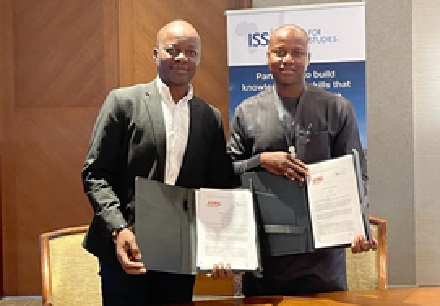Joseph Asunka and Fonteh Akum with the signed document
Afrobarometer (AB) has renewed its Memorandum of Understanding (MoU) with the Institute for Security Studies (ISS), reaffirming their joint commitment to promoting accountable governance in Africa.
The MoU, signed by Afrobarometer CEO, Joseph Asunka, and ISS Executive Director, Fonteh Akum, marks a milestone in the partnership between the organisations, superseding the previous version signed in 2015.
The signing took place on the sidelines of the Africa Drive for Democracy Conference in Arusha, Tanzania.
“We are delighted to renew the Afrobarometer and ISS Africa MOU. We remain committed to advancing inclusive democratic governance for a peaceful and prosperous Africa,” Akum said.
ISS works with partners to build knowledge and skills that promote sustainable peace, development, and prosperity in Africa.
The renewed MoU serves as a guiding framework for collaboration between Afrobarometer and ISS, facilitating joint efforts to engage mutual stakeholders.
The scope of collaboration spans various areas, including policy research and analysis, technical assistance to policy makers and civil society, capacity building, and policy dialogue.
Leveraging Afrobarometer’s rich trove of public attitude data, the two organisations will collaborate on crucial issues such as African futures and innovation; gender equality; governance, peace, and security; climate change and adaptation; globalism; and Africa’s interests.
“I am excited about this MoU and looking forward to building on our respective comparative advantages to move the accountable and responsive governance agenda in Africa forward,” Asunka said.
Afrobarometer is an independent pan-African research network that provides data on African citizens’ values, evaluations, and experiences.
Under the previous MoU, ISS used Afrobarometer data to conduct analyses on security and election issues across the continent, leading to the publication of more than 30 policy briefs and the inclusion of data in various policy events.
By Jamila Akweley Okertchiri


